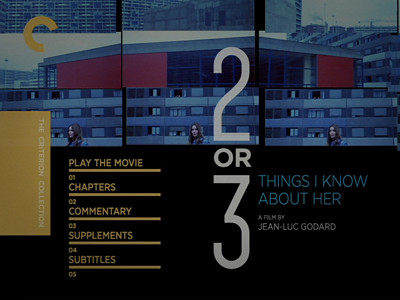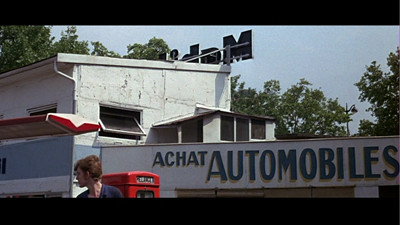"Language is the house man lives in."

This is the second time I've seen Jean-Luc Godard's 1967 film 2 or 3 Things I Know About Her, and I still am not entirely sure what to do with it. It's a complicated movie, obtusely structured, full of ideas and jarring storytelling conceits, but also aesthetically pleasing, glowing with bright colors and full of beautiful girls. At the end of the film Godard shot alongside this one, the (by comparison) more conventional Made in U.S.A., he made a declaration with a double meaning, "Left, Year Zero." Being as Anna Karina and Philippe Labro were discussing politics, it leads one to believe that it's a call to the radical thinkers to get back to basics, but since they are also in a car, it's a direction, turn left to get back to square one.
That declaration is also tied to the belief that language is dead, we need to redefine how we classify and communicate. These were ideas that were very much on Godard's mind as he headed for the death of cinema that was his kiss-off to the 1960s, Weekend. He was looking for a way to put cinema back at its reset point, to understand further how language transcends image, how both can push ideas across. In 2 or 3 Things, comic strips are mentioned as a prime example of the disparity between what is written and what is seen, between explanation and perception, form and function.

Though this twitchy film rarely sits still for long, we could break it down to two narrative lines. In one, Godard shows us construction and the changing Parisian landscape, as he speaks to us in hushed voiceover about progress, capitalism, and the way modern man being pushed to constantly go forward becomes a means for holding him back. In the other, he follows Juliette Janson (Marina Vlady) through her day, from doting mother and wife to prostitute and back home again. This idea came from a newspaper article Godard had read that detailed how life in newfangled high-rise projects demanded more money than most families could afford, and so women were turning tricks to make ends meet. Intrigued by this idea, how having a less personal space ended up costing people more money and encouraged drastic solutions, Godard made it the subject of this picture.
Juliette--or, as it were, Marina, since our introductions to the actress and the character are presented back to back, with little change to the description--is not the only working girl Godard's camera settles on. He and his regular cinematographer, Raoul Coutard, shoot 2 or 3 Things like a documentary, and each woman they meet speaks directly to the camera and the unseen maestro conducting her interview. In reality, Godard was speaking to these actresses through an ear piece, so that they could hear his questions and respond, or even parrot the lines he fed them. This is why they are often looking at the camera expectantly, not entirely in the moment. They are actually more present than most actresses, the façade having been wiped away, waiting for their prompt.

Though many of the elements Godard displays--construction, mechanics, commercials, fashion magazines, shopping, beauty parlors, Vietnam--seem disparate, in his theorizing, they are all combined. Progress demands consumption, consumption in turn has certain economic demands, and these economic demands lead to more oppressive politics, a way for the governing powers to further control the populace. In an early exchange, when Juliette's husband (Roger Montsoret) is listening to Lyndon Johnson talk about attacking North Vietnam, Juliette reads to him from a fashion magazine, wondering what stockings to buy. He can't believe she is concerned with such trivial things, she insists he has no culture. Godard wants us to see that it's in the interest of the powers that be to keep Juliette concerned about such superficialities, it keeps us from acknowledging the horrors that are occurring all around us.
Typing it out, I realize that this sounds vaguely like a crazy conspiracy theory, and there is something almost conspiratorial about this film. By whispering his narration, it's like Godard is inviting us into a huddle where he is sharing these volatile secrets. It also fits the faux documentary aesthetic, sometimes coming off like he doesn't want to disturb the characters onscreen or alert them to his presence. Some Godard theorists also think it's because he's grown less detached and more personal, that this is him confessing and telling his audience how he really feels. In Made in U.S.A., the taped confession was of a character and based on real-life political testimonies; in this case, it's all JLG.

There is an interesting line of inquiry to be followed in this film in terms of the sexual politics. It would actually be easy to paint Godard as a sexist himself. In Made in U.S.A., his last film with ex-wife Anna Karina, one interpretation sees him as portraying her as killing off his innocence. At the time of this film, Godard was nursing a broken heart and bruised ego after his new star, Marina Vlady, rejected his marriage proposal. Hence, it could be dirty editing room trickery to say she and her role are one and the same, to suggest all actresses are whores. This would mean the scene between husband and wife where Vietnam is considered less relevant by the woman than her leggings is Godard belittling women intellectually (and, indeed, the bespectacled Robert character, the mechanic who builds things while also clinging to his ideas and ideals, often looks like the director). I think this would be a false assumption, however, that it misses Godard's larger argument about capitalism vs. communism, and that all work is prostitution in its way. Robert doesn't own his own garage, after all, he toils for someone else the way a film director may toil for a producer or a studio.

If we're to accept a more positive view of the women in 2 or 3 Things, then it's a sympathetic ear Godard lends when he lets them tell their stories. He is also exposing the institutional crime that not only condones their subjugation, but perpetuates it; he prefaces many of their tales by pointing out how they are really just the same old stories we've heard before. Again, it comes down to our use of language and to communication. Near the end of the movie, he depicts two conversations in a café. One is between Robert and an unknown girl (Juliet Berto), and though it starts innocently enough, the man soon turns the topic to sex. Across the way, a student (Blandine Jeanson) talks to what is supposed to be a Nobel Prize-winning author (Jean-Pierre Laverne), but what begins as an exchange of theory turns into another chat about the banal. No one knows how to talk with one another anymore, especially not in the movies (or so says Robert).

Lip prints in my coffee...
This adds more meaning to when Juliette and the other working girls talk to the camera about the ideas in their heads, about their descartesian philosophical conundrums. Then again, if they think and therefore are, Godard gives us another troubling irony here. These girls aren't sharing their innermost thoughts, they are sharing what the writer/director tells them to share. Are we back to him saying women have no mind of their own? Let's not forget, he's also letting us ogle them, admiring their beauty with and without clothes, all for the price of a ticket (or, as it were, a DVD). Again, I don't think so, but one would hope it's not a contradiction lost on the director. The Bertold Brecht quote Juliette recites at the outset is another piece of evidence working in Godard's favor.

Godard's awareness is important becaue, ultimately, one of the main conclusions that the movie comes to, and one uttered by Juliette/Marina, is that what we see and experience and how we describe it not only effects us, but the world around us. And vice versa. When we build these cheaply made but overly priced commercial spaces that have no individual personality beyond the advertising that pushes us toward further consumption, it's no wonder we end up in an endless cycle of drudgery, unable to express ourselves, disinterested and shallow. In the final image of the film, Godard places an idyllic drawing of a loving couple in the middle of an arrangement of commercial products, a diorama of our materialistic lives. There we are, lost amongst the laundry detergent. These things take us back to zero, he moans, and we have to start over from there. Hit the button and go back to the start, or you'll end up so clean, scrubbed so sparkling white, you just might disappear.

"If by chance you can't afford LSD, then buy a color TV."
* The first time, it was because I was prompted by writer Matt Fraction. I told him I was working on a book called 12 Reasons Why I Love Her

For a full rundown on the special features, read the full article at DVD Talk.

6 comments:
Good post to read. Thanks to the author for sharing this good post. Keep sharing more good blogs. Divorce Lawyers Loudoun VA
Facing a preliminary protective order in virginia? Seek legal guidance to understand the implications and options available for your situation.
traffic lawyer dinwiddie virginia
consequences of reckless driving in virginia
dui lawyer harrisonburg va
contract dispute resolution process
Jean-Luc Godard's '2 or 3 Things I Know About Her' is a masterclass in avant-garde filmmaking, offering a thought-provoking exploration of modern life and identity. The film's innovative narrative style leaves a lasting impression on the audience, making it a visual and intellectual feast. Godard's bold and unapologetic direction pushes the boundaries of storytelling, and critics and audiences alike praise the film's daring approach and profound themes. Prepare to be captivated by the enigmatic beauty of '2 or 3 Things I Know About Her'.
What a beautiful tribute to her! Your ability to capture her essence in just a few key points is truly impressive. I could feel the love and admiration you have for her in every word. Thank you for sharing this heartfelt piece
heat resistant gloves
What a beautiful tribute to her! Your ability to capture her essence in just a few key points is truly impressive. I could feel the love and admiration you have for her in every word. Thank you for sharing this heartfelt piece
safety equipment
Your words truly painted a vivid picture of her, leaving me wanting to know more. Such a unique perspective in this post, I can't wait to read more about her
safety ear protection
Post a Comment